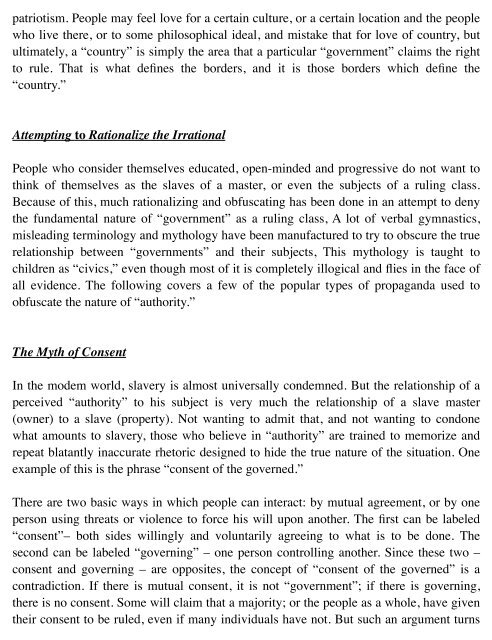the-most-dangerous-superstition-larken-rose-20111
the-most-dangerous-superstition-larken-rose-20111
the-most-dangerous-superstition-larken-rose-20111
- No tags were found...
Create successful ePaper yourself
Turn your PDF publications into a flip-book with our unique Google optimized e-Paper software.
patriotism. People may feel love for a certain culture, or a certain location and <strong>the</strong> peoplewho live <strong>the</strong>re, or to some philosophical ideal, and mistake that for love of country, butultimately, a “country” is simply <strong>the</strong> area that a particular “government” claims <strong>the</strong> rightto rule. That is what defines <strong>the</strong> borders, and it is those borders which define <strong>the</strong>“country.”Attempting to Rationalize <strong>the</strong> IrrationalPeople who consider <strong>the</strong>mselves educated, open-minded and progressive do not want tothink of <strong>the</strong>mselves as <strong>the</strong> slaves of a master, or even <strong>the</strong> subjects of a ruling class.Because of this, much rationalizing and obfuscating has been done in an attempt to deny<strong>the</strong> fundamental nature of “government” as a ruling class, A lot of verbal gymnastics,misleading terminology and mythology have been manufactured to try to obscure <strong>the</strong> truerelationship between “governments” and <strong>the</strong>ir subjects, This mythology is taught tochildren as “civics,” even though <strong>most</strong> of it is completely illogical and flies in <strong>the</strong> face ofall evidence. The following covers a few of <strong>the</strong> popular types of propaganda used toobfuscate <strong>the</strong> nature of “authority.”The Myth of ConsentIn <strong>the</strong> modem world, slavery is al<strong>most</strong> universally condemned. But <strong>the</strong> relationship of aperceived “authority” to his subject is very much <strong>the</strong> relationship of a slave master(owner) to a slave (property). Not wanting to admit that, and not wanting to condonewhat amounts to slavery, those who believe in “authority” are trained to memorize andrepeat blatantly inaccurate rhetoric designed to hide <strong>the</strong> true nature of <strong>the</strong> situation. Oneexample of this is <strong>the</strong> phrase “consent of <strong>the</strong> governed.”There are two basic ways in which people can interact: by mutual agreement, or by oneperson using threats or violence to force his will upon ano<strong>the</strong>r. The first can be labeled“consent”– both sides willingly and voluntarily agreeing to what is to be done. Thesecond can be labeled “governing” – one person controlling ano<strong>the</strong>r. Since <strong>the</strong>se two –consent and governing – are opposites, <strong>the</strong> concept of “consent of <strong>the</strong> governed” is acontradiction. If <strong>the</strong>re is mutual consent, it is not “government”; if <strong>the</strong>re is governing,<strong>the</strong>re is no consent. Some will claim that a majority; or <strong>the</strong> people as a whole, have given<strong>the</strong>ir consent to be ruled, even if many individuals have not. But such an argument turns


